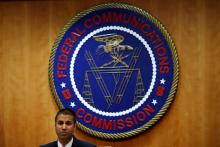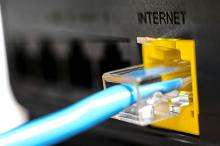FCC

Last month, social justice advocates gathered outside of the Federal Communications Commission to speak out. Aja Taylor with Bread for the City — a direct service organization in Washington, D.C. — stopped us in our tracks with this question: “Can you imagine being on the wait list for subsidized housing for eight years, but miss your opportunity because when your name finally comes up, no one can reach you?”
It is stories like these that reinforce my belief in the fundamental connection between communications justice and social justice. Communication is a human right —a tool that connects us to our communities, helps to disclose injustice, and facilitate innumerable aspects of modern life.

WITH EACH PASSING week of his administration, the epic scale of the deception Donald Trump pulled off last November becomes more evident.
In his last TV ad of the presidential campaign, Donald Trump decried “a global power structure that is responsible for the economic decisions that have robbed our working class, stripped our country of its wealth and put that money into the pockets of a handful of large corporations and political entities.” Two weeks earlier, when the AT&T-Time Warner merger was announced, Trump said: “As an example of the power structure I’m fighting, AT&T is buying Time Warner and thus CNN, a deal we will not approve in my administration because it’s too much concentration of power in the hands of too few.” Later he added, “Deals like this destroy democracy.”
Since then, of course, the great champion of the people has given us a Treasury secretary (Steven Mnuchin) who, as a hedge fund manager and banker, made a specialty not only of “robb[ing] our working class,” but foreclosing on their homes to boot. And now the candidate who condemned the AT&T-Time Warner merger as oligarchic and anti-democratic has become a president whose most recent comment on the merger was simply, “I haven’t seen any of the facts, yet.” Worse still, Trump has appointed a Federal Communications Commission chair (Ajit Pai) who has promised to undo the Obama-era net neutrality regulations, and who never met a media merger he didn’t like. For example, Pai, who has worked as a lawyer for Verizon, said he would have approved the Comcast-Time Warner Cable merger that the Obama FCC blocked in 2015.

Senator Ed Markey (D-MA), along with the support 40 co-sponsors, have amassed the 30 votes necessary to seek to reverse the net neutrality repeal through the Congressional Review Act.

"You and I and everyone else who uses the Internet for personal use will see some changes in pricing models. For most of us, I expect we will pay more. Service bundles (e.g., social media package, streaming video package) will likely be bolted on to basic transport for things like web surfing and email," Glenn O'Donnell, an industry analyst at the research firm Forrester, wrote in an email.

Today, the Open Internet Order goes into effect. Many business owners, entrepreneurs, and economists are praising the order as a win for the economy. But there’s an unexpected voice in the chorus of praise: America’s faith leaders.
As a Christian and Sikh, we are celebrating the Open Internet Order, because the communities we serve cannot flourish today without an open and free Internet. The order codifies principles that have governed the Internet in the U.S. for decades. It keeps the Internet an open space for free speech, including religious expression.

THE BATTLE over net neutrality keeps getting stranger and stranger.
For years the lines were clearly drawn. On the “pro-” side were the content-providing companies (Google, Netflix, Amazon, etc.) and the public interest and consumer groups that want to preserve equal access to a potential audience of billions. Arrayed against them was Big Telecom (Verizon, Time Warner Cable, Comcast, etc.), which wanted the internet to work more like cable TV, where consumer choice is limited to the menu the provider offers.
But now the idea that internet service providers should be prohibited from charging content providers for faster downloads has become so popular that even its sworn enemies claim to favor it. They’ve even rounded up some of their most fervent supporters in Congress to push “net neutrality” legislation, which may come with a rider proclaiming that “war is peace.”
Comcast, the nation’s largest cable and broadband provider, pioneered this Orwellian strategy. For several months now Comcast has run print, TV, and online ads hailing its support for net neutrality—no “blocking” of sites, no “throttling” of download speeds, and no “paid prioritization” giving faster speeds to the highest bidder. Not only does Comcast support those principles, it says, but it is in fact the only internet service provider that has made a legally binding commitment to abide by them. And, by the way, if the Federal Communications Commission (FCC) would just approve Comcast’s merger with Time Warner Cable, it would extend those protections to all Time Warner customers, too.

FOR SEVERAL years now, a debate has raged over the issue of “net neutrality,” pitting media reformers, digital libertarians, and “content” companies such as Amazon and Netflix against old-school telecommunication giants such as AT&T and Comcast, with the Federal Communications Commission serving as an erratic referee.
Sometime early this year, the U.S. Court of Appeals for the District of Columbia may settle the question when it decides the case of Verizon vs. the FCC. If the court decides in favor of Verizon, big telecom companies will have won the right to decide what digital content we can receive, especially when it comes to video and other bandwidth-intense media.
Simply put, the issue in the Verizon case is whether broadband internet will follow the “common carrier” precedent applied to telephone lines and the electricity grid or the model of cable TV. The common carrier principle guarantees equal access to necessary public utilities. Applied to the internet, this has meant that service providers simply supply the fiber-optic cable or wireless spectrum, give equal access to all content providers, and charge the final recipient of the data (you and me) a fee that covers the cost of maintaining an adequate network.
In the cable TV business model, the provider controls the network of fiber optic cable and the content that goes over it. The cable company decides which channels are included in the basic package, which (like HBO) are purchased separately, and which will be unavailable at any price. If you want Al Jazeera instead of Fox News, too bad—it’s a take it or leave it package.
AS THIS IS written, the Federal Communications Commission is, again, preparing to rule on a revision of its media ownership rules that could, again, allow the few remaining mass media conglomerates to own even more of what are currently competing local news outlets. For one thing, the proposed revision would allow Rupert Murdoch's News Corporation to have its Los Angeles and Chicago TV stations and eat the L.A. Times and Chicago Tribune, too.
Five years ago, the Bush administration's FCC commissioners tried this move, but it was routed in a decision by a federal appeals court. But, just in time to quash any illusions that a second Obama administration might be less friendly to corporate power, Julius Genachowski, the Obama-appointed FCC chair, tried, at the end of 2012, to quietly slip in this new set of Murdoch-friendly ownership rules. The only reason it may not have happened already is because he raised the issue at the same time that an FCC report on minority media ownership arrived showing the share of outlets owned by people of color to be only 2.2 percent for commercial full-power television and 6.2 percent for commercial AM radio. This, needless to say, raises questions about the wisdom of further media consolidation.
Over the decades, this column has spilled a lot of ink on the subjects of the FCC, media policy, and, especially, media ownership. I haven't obsessed over these issues because of any love for the details of broadband allocation and other regulatory minutiae. In fact, I struggle to understand some of those matters just well enough to try and explain why they are important. But they are important, mostly because deregulated and monopolistic mass media impinge upon our ability to effectively exercise our God-given free will and participate rationally in the process of self-government.